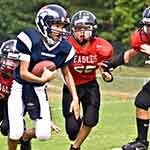The Benefits of a Growth Mindset in Youth Sports
A Conversation with Kelly Gray What’s a growth mindset in youth sports and how does it benefit young athletes? We explored that topic in a second podcast interview with Kelly Gray, a former professional soccer player who worked with youth sports organizations for many years. He’s founder of Kelly Gray … Read Sport Psychology Tip




